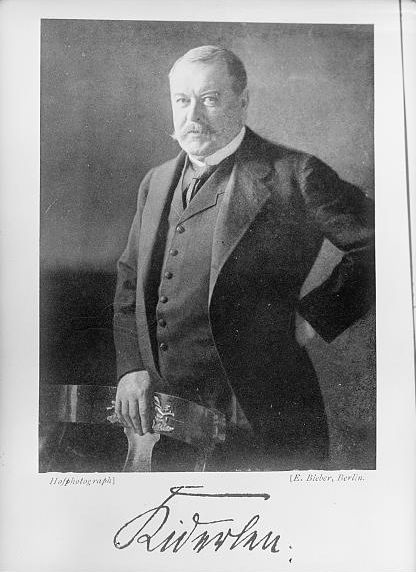<Back to Index>
- Chemist Kurt Alder, 1902
- Painter Giorgio de Chirico, 1888
- Foreign Minister Alfred von Kiderlen - Waechter, 1852
PAGE SPONSOR

Alfred von Kiderlen - Waechter (10 July 1852 – 30 December 1912, né Alfred Kiderlen) was a German diplomat and politician, who served as Foreign Secretary and head of the Foreign Office from 27 June 1910 to 30 December 1912.
The son of a banker from the Kingdom of Württemberg, Robert Kiderlen, and Baroness Marie von Waechter, he was born in Stuttgart. His father was elevated to the personal nobility in 1852. In 1868, Alfreds mother Marie Kiderlen and her children Alfred, Sarah and Johanna were elevated to the hereditary nobility with the name von Kiderlen - Waechter, combining the names and coats of arms of the Kiderlen and Waechter families. His name is occasionally spelled Kiderlen - Wächter, however, the correct spelling is Kiderlen - Waechter.
Kiderlen - Waechter fought as a volunteer in the Franco - German War (1870 - 1) and then studied at different universities, retaining throughout his subsequent career a good deal of the jovial manner of a German student (burschikos). Following studies of law, he joined the foreign service in 1877, and was stationed in Copenhagen, St. Petersburg, Paris and Constantinople. He became envoy to Copenhagen in 1895. Later, he served for ten years as envoy to Bucharest. He was also acting as the representative of the ambassador in Constantinople during the illness of the ambassador, and negotiated the construction of the Baghdad Railway. In 1908, he was appointed Deputy Secretary of Foreign Affairs, and returned to Berlin. He played a central role during the Bosnia Crisis, and negotiated an agreement with France over Morocco.
After the resignation of Chancellor Bernhard von Bülow in 1910, Kiderlen became Secretary of State. His attempt to reach an understanding with other great powers largely failed.
He died in 1912 in Stuttgart.